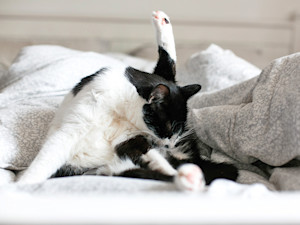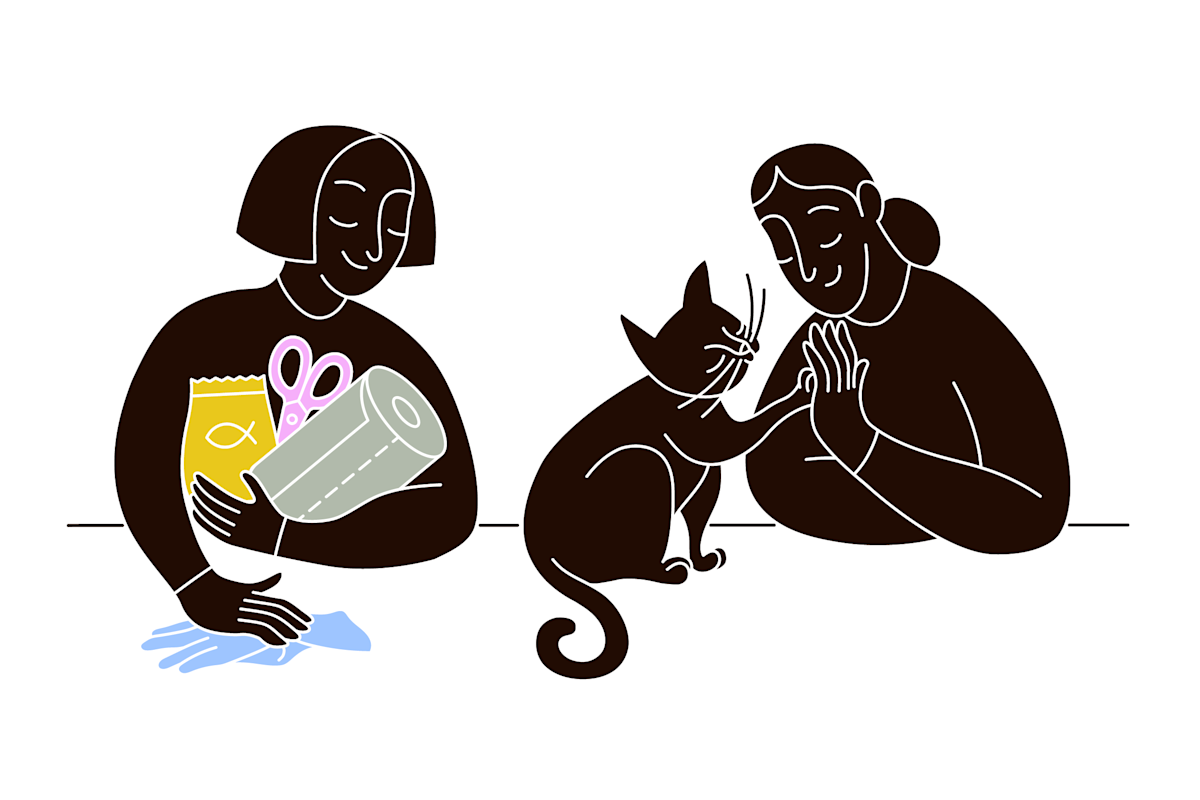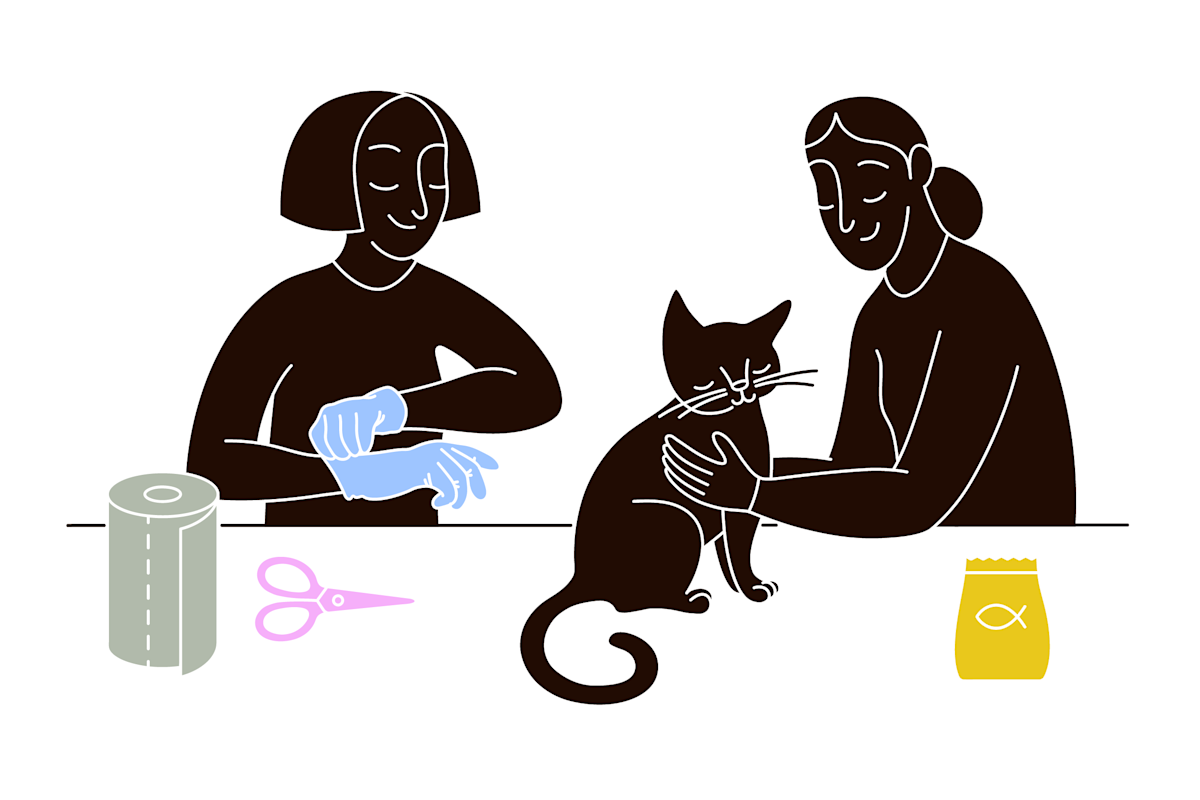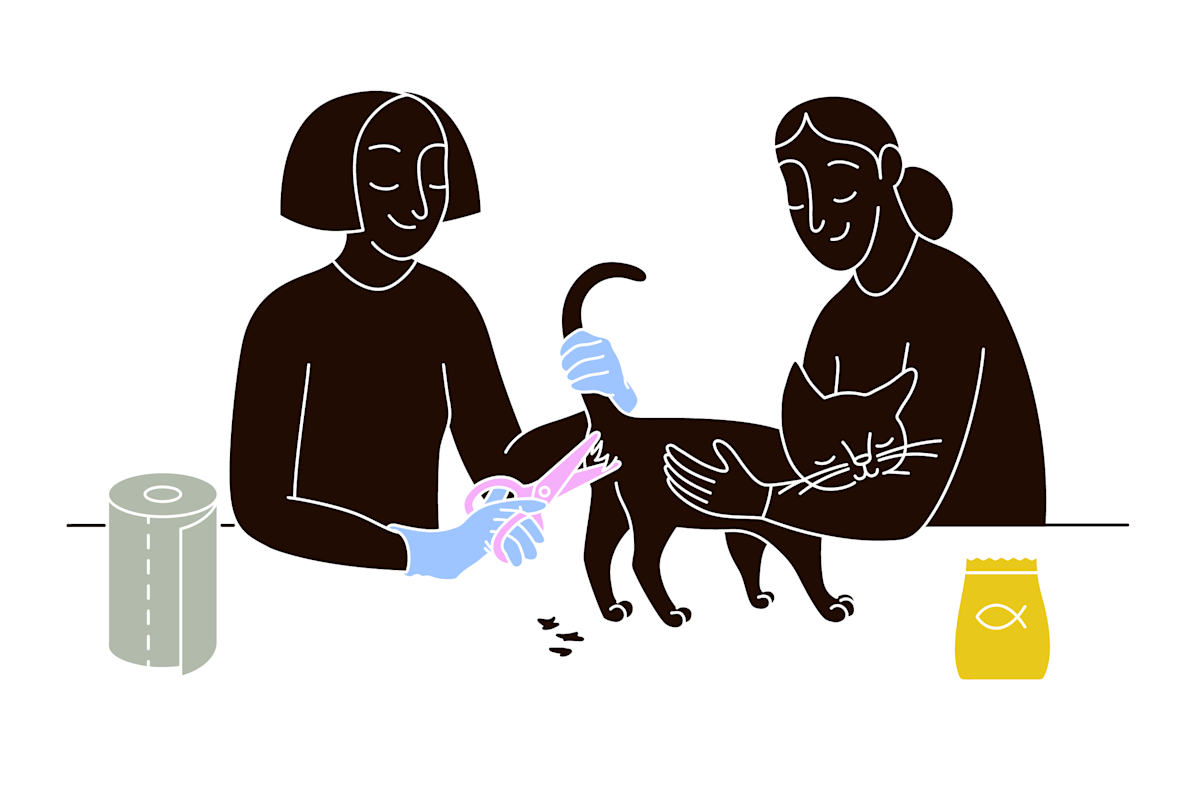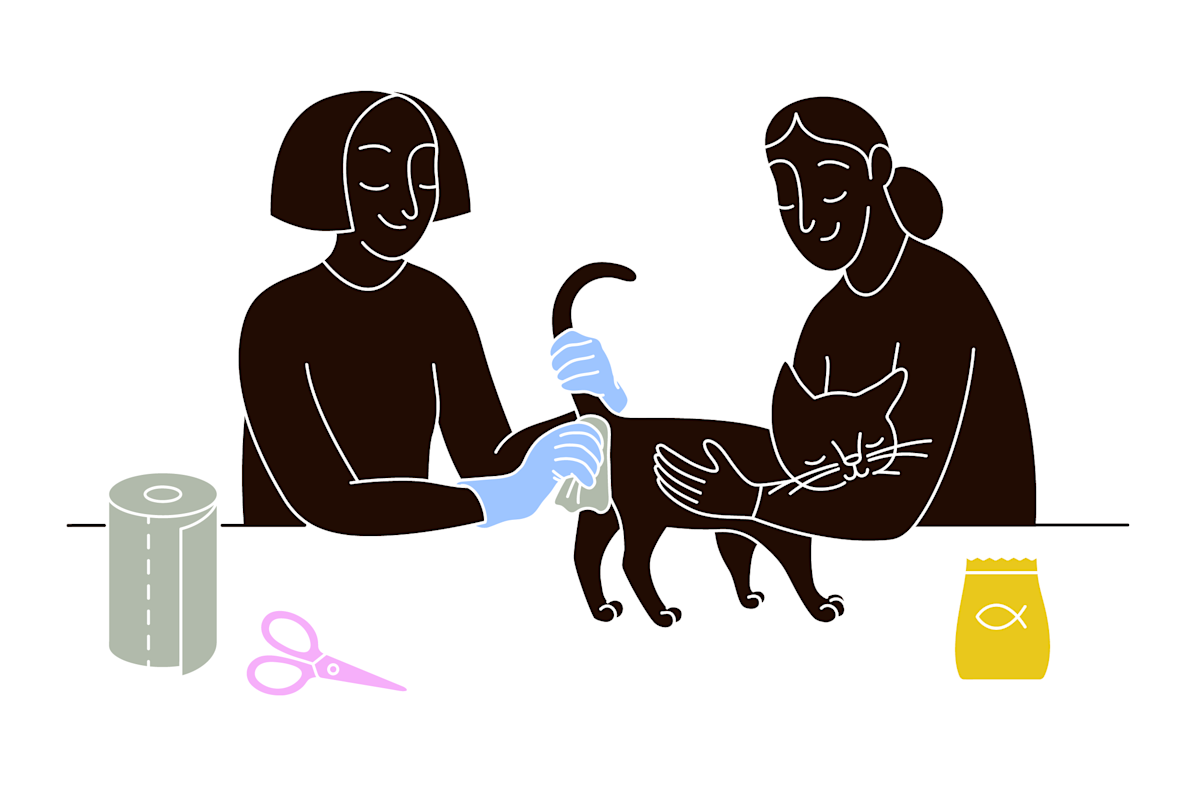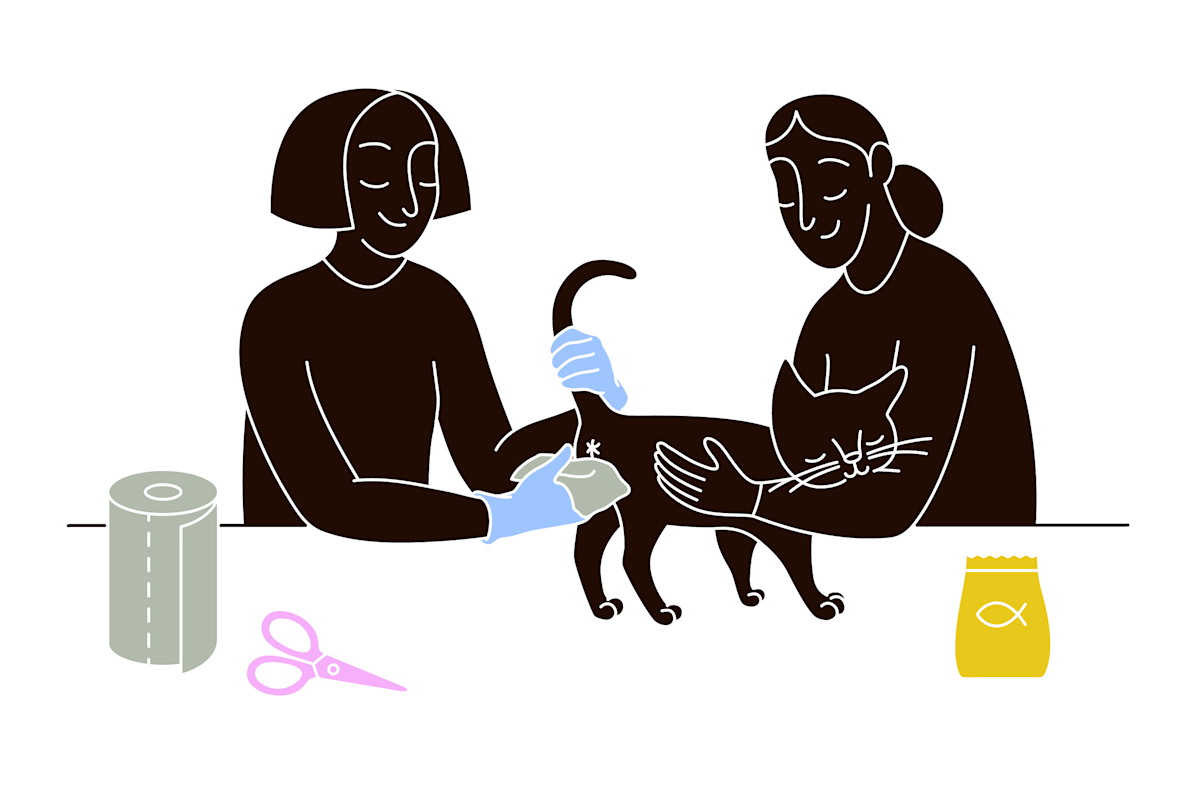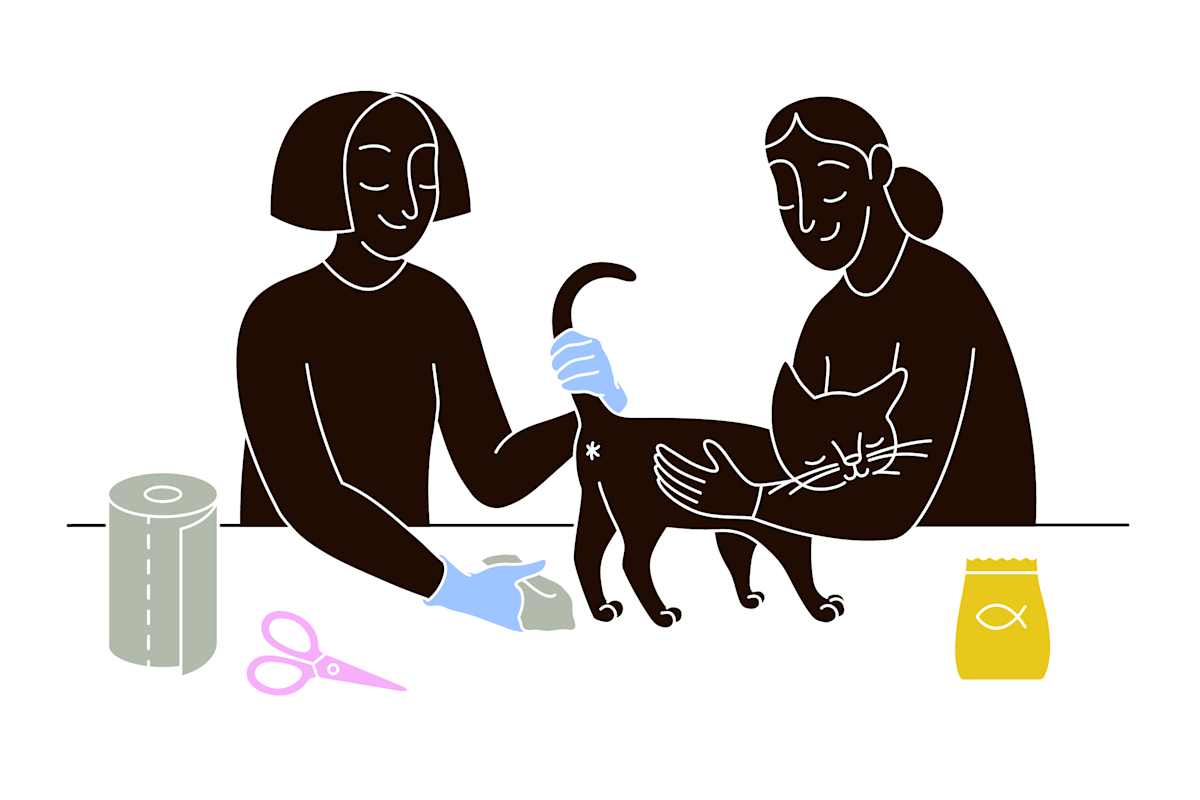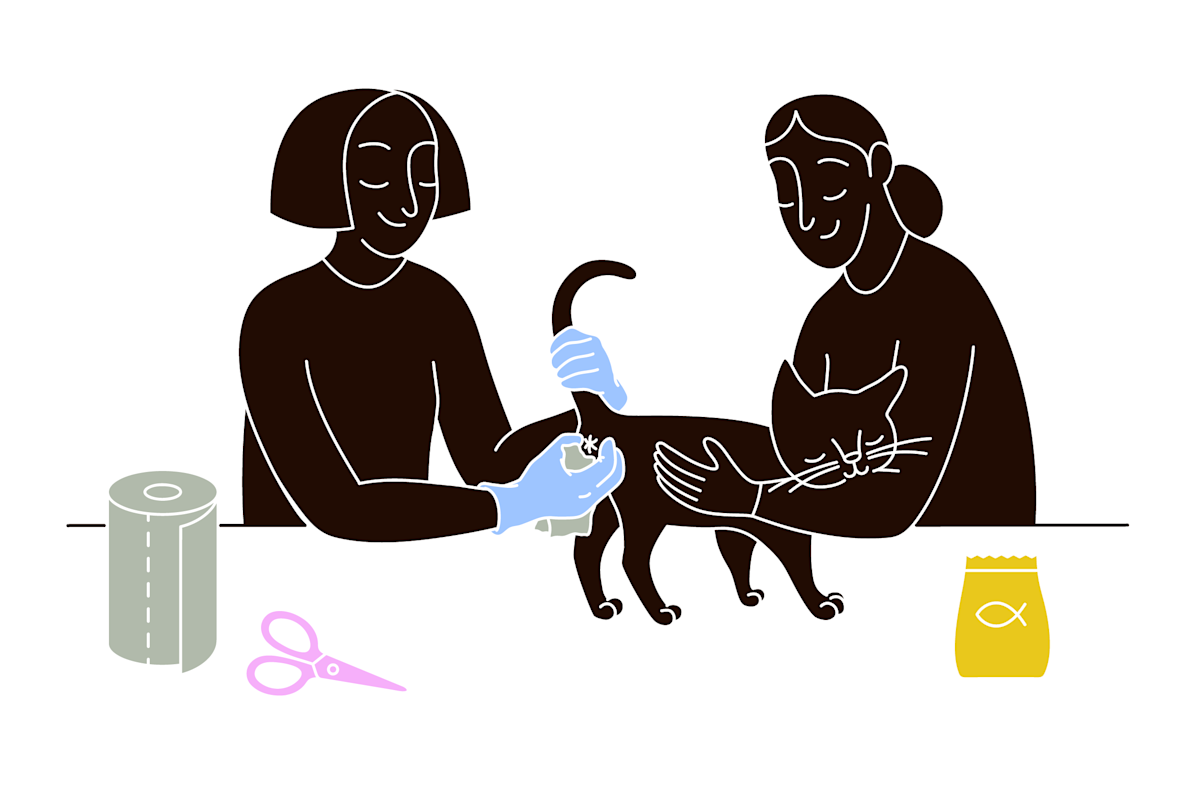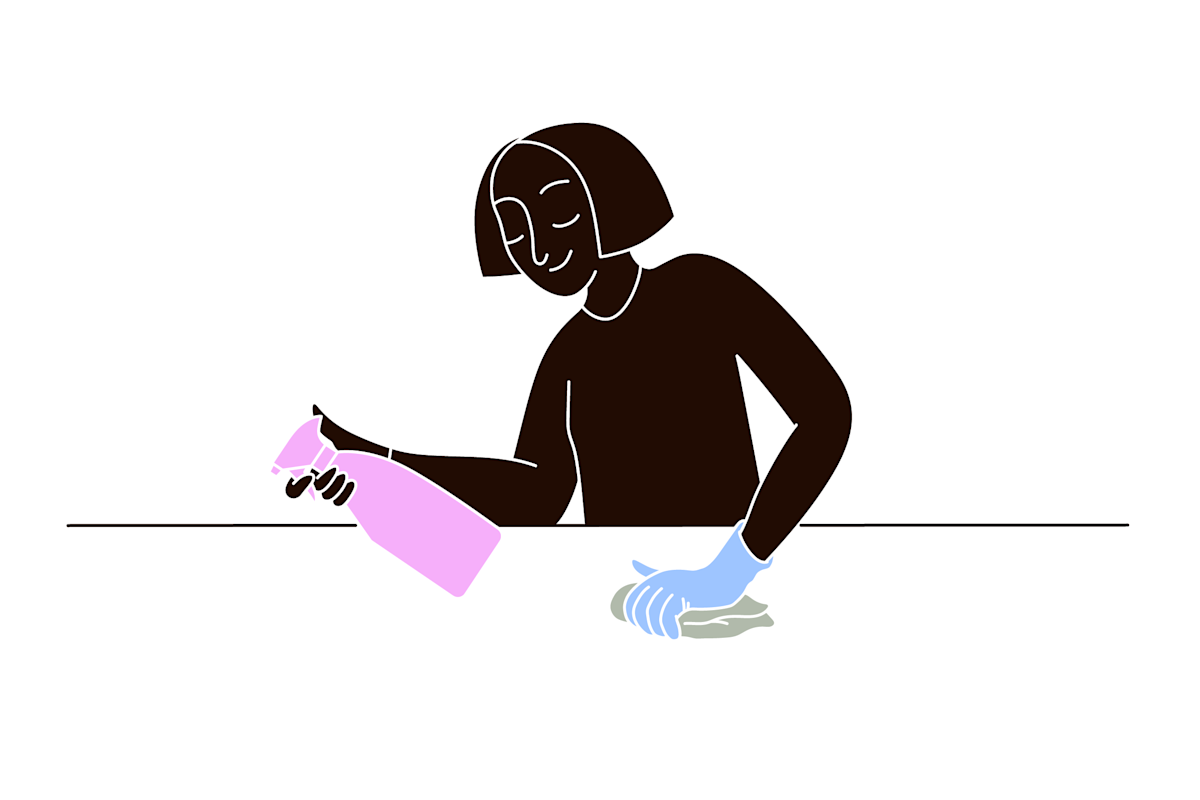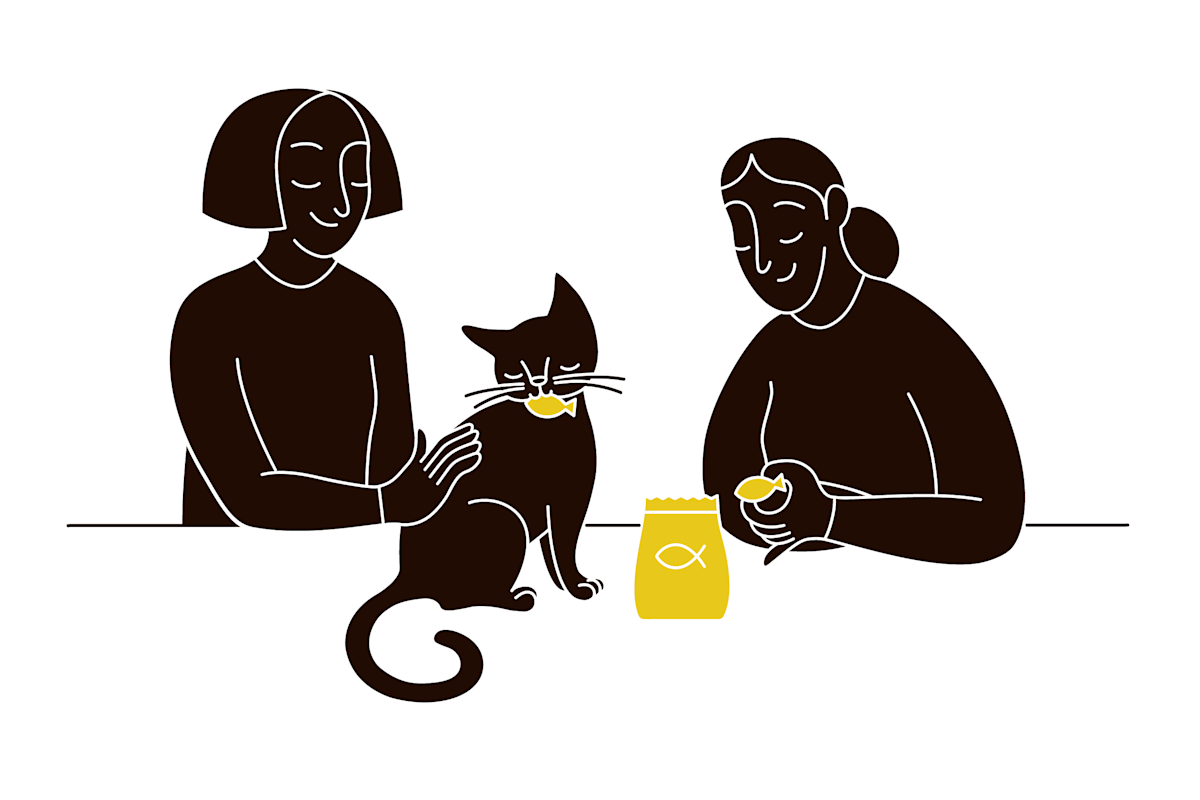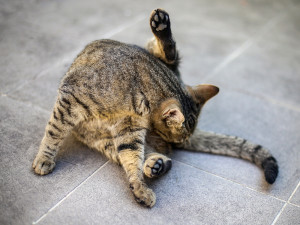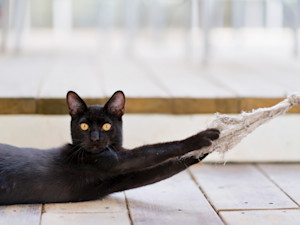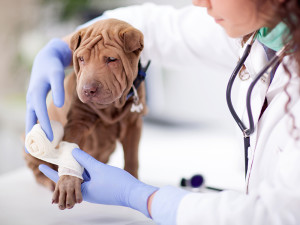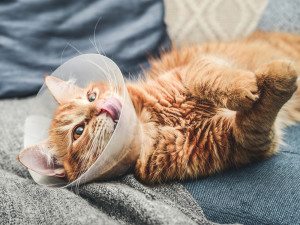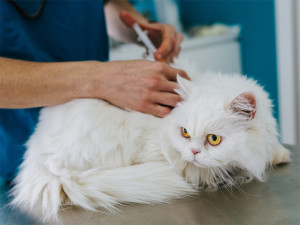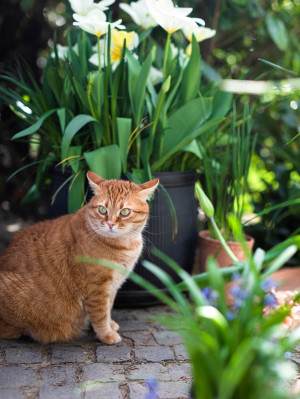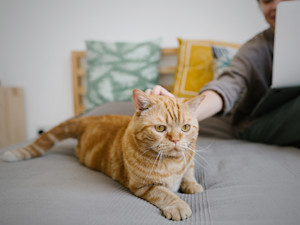When and How to Express Your Cat’s Anal Glands
Ick. It won’t be fun, but here’s how to get the job done.
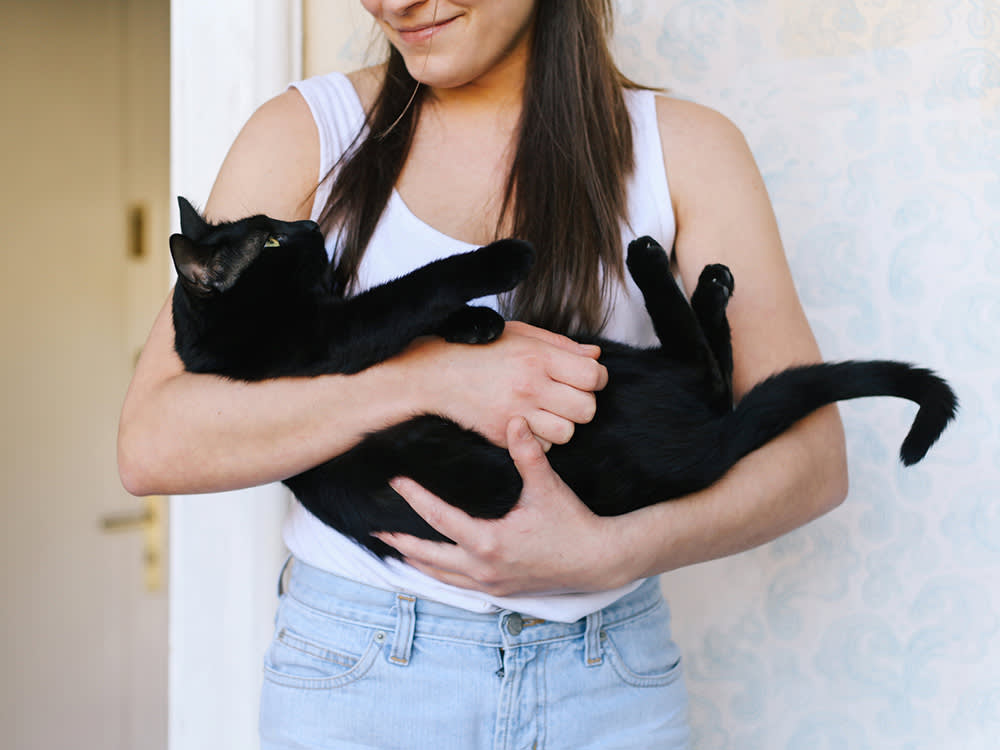
Share Article
In This Article:
What Are Cat Anal Glands? How to Tell If Your Cat Needs Their Anal Glands Expressed Anal Gland Treatment Options for Cats When to See a Vet for Anal Gland Treatment in Cats vs. When You Can Do It At Home How to Express Your Cat’s Anal Glands at Home Should I Take My Cat to the Vet for Anal Gland Treatment? What Happens If A Cat’s Anal Glands Aren’t Expressed? Frequently Asked Questions
You normally shouldn’t have to worry too much about your cat’s anal glands, but when there’s a problem, there’s a problem. Cats with full anal glands may show increased attention to their butt, have an “off” odor, or show signs of pain. Once you determine that your cat’s symptoms may be due to their anal glands, you have a decision to make: Do I let my vet handle this or do I try to take on this smelly task at home?
If you’ve decided to express your cat’s anal glands yourself, first identify the small sacs located around the anus, then gently place your thumb and forefinger on either side and apply light pressure upward and inward until the fluid releases onto a paper towel. Always wear gloves and work in a well-ventilated area. If you notice difficult expressing the glands, signs of infection, or if your cat shows extreme discomfort, consult your veterinarian.
What are cat anal glands?
Cat anal glands should technically be called anal sacs. These are little pea-sized sacs located between the muscle layers of the anal sphincter, and lined with anal glands that secrete a highly-scented fluid. Anal glands usually empty on their own, but not always.

Cats will normally express a small amount of fluid from their anal glands while pooping or when frightened. This leaves behind a distinct scent that helps mark their territory. When the goo inside the anal sacs gets very thick or the duct gets clogged, this material doesn’t come out like normal. Expressing an impacted or clogged anal sac will help to empty it before infection develops.
Do cats need their anal glands expressed?
Most cats don’t need their anal glands expressed, and it’s a procedure that should only be performed under vet advisement. Signs that your cat’s anal glands might be giving them problems include the following:
Scooting
This is a classic sign that your cat is uncomfortable and trying to relieve pressure from full anal glands.
Licking or biting
Cats with anal gland issues may lick or bite their rear end excessively, indicating discomfort. Some will even plop down mid-stride to address the painful area.
Foul odor
If your cat’s anal glands are full, they may leak a greasy, foul-smelling liquid.
Redness, inflammation, or swelling around anal area
The skin around your cat’s anus may be red, inflamed, or swollen if their anal glands are infected. Infected or inflamed anal glands are a medical problem and should not be expressed at home.
Painful to poop
Your cat may meow or yowl while using the litter box or seem to strain before they poop. This could mean their anal glands have become swollen and infected, though many other causes are possible and need to be checked out by your vet.
Blood in feces
If you see blood in your cat’s feces, you should go to your vet. You’re not going to be able to do much at home for this, even if it is an anal gland issue.
Chasing their tail
Cats who have arthritis or too much of a belly may have trouble reaching their butt to groom. This can result in cats positioning their bodies and tails in a way that they can attend to their full anal glands.
Meowing to get your attention
Cats may show attention-seeking behavior when they have a problem they can’t solve on their own.
How to express your cat’s anal glands at home
Expressing your cat’s anal glands is not a traumatic process and should not be painful, but many cats do not want you poking around back there. If your cat seems to be in pain at any point during this process, stop what you’re doing and let a professional handle it.
These steps should help guide you through the procedure, but expressing anal glands can be trickier than it seems. This will cover the external method of anal gland expression.
1. Gather your materials. You will need:
Latex or nitrile gloves.
Moist wipes or a damp paper towel.
A treat or two.
A sturdy surface for your cat to stand on, such as a bathroom countertop.
Ideally, a second person to hold the cat’s front end.
2. Hold your cat still.
Calmly hold your cat in one place.
3. Trim excess hair back, if necessary.
This scent sticks to everything, so long-haired cats may need some sanitary clipping to keep things from getting nasty.
4. Wipe away any dried debris.
Use a moist wipe or a damp paper towel to wipe away any dried debris from around the anus.
5. Hold a paper towel over the anus.
Be careful — the liquid you’re after is under pressure and can shoot unexpectedly far. You’ll smell it for days if it lands where you can’t find it.
6. Lift the tail and locate the glands.
After lifting the tail straight up, it’s easiest to put the tips of your thumb and forefinger on either side of the tail base (over the back half of your cat’s pelvis), then move them down until you’re no longer pushing on the tail. You should be over the rectum at this point, so slide those fingers toward the rear until you feel the thicker tissue of the anus. The anal glands are small, round sacs that are located on either side of the anus. They will feel like small, firm peas if they’re full.
7. Push on the glands to express them.
Gently pinch inward with the glands pushed together between your fingers. Apply gentle pressure and push upwards and towards the sphincter until the glands express their contents. You may see or smell a small amount of material expressed. It can be yellow to brown in color and come out as a liquid or paste.
8. Clean up.
Use a moist wipe or a damp paper towel to clean up any mess.
9. Reward your cat.
Give your cat a treat or two as a reward for their cooperation.
Should I take my cat to the vet for anal gland treatment?
There are two options for taking care of full anal glands in a cat: seeing a professional or doing it yourself. It’s best to see a professional for guidance if you’ve never expressed your cat’s anal glands before or if you’re not sure if their symptoms are due to full anal glands. Anal glands that are simply full usually just need to be squeezed and emptied. Infected or impacted anal glands need more intense therapy that cannot be taken care of at home.
You can consider expressing your cat’s anal glands at home if you’ve been given the go-ahead from your vet and the sacs are full, but not swollen, red, or painful. If you notice warmth, swelling, pain, redness, or bloody discharge in the area, stop and contact your vet — infection in this area is a whole different problem and not something you can take care of at home. Even if the glands are just full, it’s fine to leave this process to a professional, especially if you haven’t done it before or are worried about cat bites.
The overwhelming majority of cats do not need to have their anal glands expressed. But some cats with chronic anal gland issues may need their glands expressed as often as every three to four weeks. Other cats will only need it when they’re showing signs of discomfort.
What happens if a cat’s anal glands aren't expressed?
Cats will usually express their anal glands on their own when they defecate or are frightened, but sometimes this doesn’t work out like it should. In many cases, overfull anal glands will leak into the surrounding fur when there’s enough pressure built up in the sac. Sometimes cats aren’t able to express their full anal glands on their own though. Buildup of material within the anal sacs can lead to problems such as:
Anal gland abscesses
Anal sacs full of excessively thick material or with clogged ducts can become inflamed, infected, or abscessed. An anal gland abscess appears as red to purplish swelling at the four o’clock or eight o’clock position beneath the anus. This swelling will often be markedly painful and may be firm or fluid-filled, depending on the stage of the disease.
Cats will lick at an anal gland abscess until it ruptures. Anal gland abscesses should be treated by your veterinarian to make sure they resolve fully; otherwise, if the anal glands are not expressed, they can lead to anal glad diseaseopens in new tab.
Anal sac disease
Chronic anal sac diseaseopens in new tab is less well-defined for cats because they’re less commonly affected than dogs. Some cats may be predisposed to issues with their anal sacs due to allergies, anatomical abnormalities, cancer, or gastrointestinal issues. Cats with anal sac disease may need regular expression of their anal glands to prevent recurrent problems. In cases with frequent recurrence, surgery to remove the anal sacs completely can be considered.
Bottom line
Expressing a cat’s anal glands is no fun for anyone involved. Fortunately, most cats never need this done. If it’s necessary due to a medical issue, it’s easiest to let your vet’s office or an experienced groomer handle it.
While anal gland expression is something that some cats will tolerate at home, you should never mess with an anal gland that is red, bleeding, swollen, or painful.
FAQs
Why would I need to express my cat’s anal glands?
Your vet may recommend expressing your cat’s anal glands due to prior problems with them. This can be done at home, but it is better handled by a vet or groomer.
Can expressing the anal glands be painful for my cat?
Although most cats don’t want you messing with their butt, anal gland expression should not be painful for cats. Any sign of pain is an indication that you should stop and contact your vet for guidance.
Are there any alternatives to manually expressing the anal glands?
Letting nature take its course is the best alternative to manually expressing the anal glands at home, but this doesn’t work for the rare cat that has anal gland problems. Some cats with recurrent issues may even need surgery to remove the anal sacs completely.
How much does it cost to express a cat’s glands?
Costs for anal gland expression will vary by region, but they should be minimal as long as there’s no infection or need for sedation. Anal gland expression can often be done by a veterinary technician or groomer once you have an established relationship.
References
Corbee, Ronald Jan et al. “A Cross-Sectional Study on Canine and Feline Anal Sac Disease.” Animals : an open access journal from MDPI vol. 12,1 95. 31 Dec. 2021, doi:10.3390/ani12010095opens in new tab
Miyazaki, Tamako et al. “Olfactory discrimination of anal sac secretions in the domestic cat and the chemical profiles of the volatile compounds.” Journal of ethology vol. 36,1 (2018): 99-105. doi:10.1007/s10164-017-0532-xopens in new tab
Gallagher, Alex. “Anal Sac Disease in Dogs and Cats” MSD Manual, https://www.merckvetmanual.com/digestive-system/diseases-of-the-rectum-and-anus/anal-sac-disease-in-dogs-and-catsopens in new tab
Jimeno Sandoval, J C et al. “Outcomes and complications of anal sacculectomy for non-neoplastic anal sac disease in cats: 8 cases (2006-2019).” The Journal of small animal practice vol. 63,1 (2022): 56-61. doi:10.1111/jsap.13414opens in new tab

Dr. Bartley Harrison, DVM
Dr. Bartley Harrison is a veterinarian with more than 19 years of experience. He has treated a variety of species in emergency and speciality practices for both large and small animals. His primary interests as a vet are emergency medicine and critical care.
Related articles
![A black cat holding onto a rope with its claws.]()
It’s Seriously Uncool to Declaw Your Cat
A cat veterinarian explains why the inhumane surgery is no joke.
![A puppy getting a wound dressed at the vet]()
Which Pet Insurance Company Is Right for You?
We compared the top insurers so you don’t have to.
![Image of orange cat with veterinary cone on its head.]()
Neutering Male Cats: Behavior and Recovery Guide
If you’re bracing yourself for some wackiness, don’t worry — it won’t last forever.
![Young person veterinarian in their veterinary clinic performing a medical examination on a pet.]()
What to Know About Rabies in Cats
There is one way to make sure your cat stays safe: vaccinate, vaccinate, vaccinate.
![Ginger adult cat sits in flowering summer garden on pavement.]()
What to Do If Your Cat Gets Stung By a Bee
It’s not always as simple as removing the stinger. Find out everything you need to know.
![Owner pets senior ginger cat.]()
6 Common Health Concerns in Senior Cats
How to spot and how to treat them.
